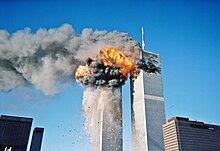
Back Terrorisme Afrikaans Terrorismus ALS Terrorismo AN إرهاب Arabic ارهاب ARZ Terrorismu AST Terrorizm Azerbaijani تروریزم AZB Терроризм Bashkir Teruorėzmos BAT-SMG
This article needs to be updated. (August 2021) |

| Part of a series on |
| Terrorism |
|---|
Terrorism, in its broadest sense, is the use of violence against non-combatants to achieve political or ideological aims.[1] The term is used in this regard primarily to refer to intentional violence during peacetime or in the context of war against non-combatants (mostly civilians and neutral military personnel).[2] There are various different definitions of terrorism, with no universal agreement about it.[3][4] Different definitions of terrorism emphasize its randomness, its aim to instill fear, and its broader impact beyond its immediate victims.[1]
The terms "terrorist" and "terrorism" originated during the French Revolution of the late 18th century[5] but became widely used internationally and gained worldwide attention in the 1970s during the Troubles in Northern Ireland, the Basque conflict and the Israeli–Palestinian conflict. The increased use of suicide attacks from the 1980s onwards was typified by the 2001 September 11 attacks in the United States. The Global Terrorism Database, maintained by the University of Maryland, College Park, has recorded more than 61,000 incidents of non-state terrorism, resulting in at least 140,000 deaths, between 2000 and 2014.[6]
Varied political organizations have been accused of using terrorism to achieve their objectives. These include left-wing and right-wing political organizations, nationalist groups, religious groups, revolutionaries, and ruling governments.[7] In recent decades, hybrid terrorist organizations have emerged, incorporating both military and political arms.[1]
- ^ a b c Cite error: The named reference
:2was invoked but never defined (see the help page). - ^ Wisnewski, J. Jeremy, ed. (2008). Torture, Terrorism, and the Use of Violence (also available as Review Journal of Political Philosophy Volume 6, Issue Number 1). Cambridge Scholars Publishing. p. 175. ISBN 978-1-4438-0291-8. Archived from the original on January 10, 2023. Retrieved September 15, 2017.
- ^ Halibozek, Edward P.; Jones, Andy; Kovacich, Gerald L. (2008). The corporate security professional's handbook on terrorism (illustrated ed.). Elsevier (Butterworth-Heinemann). pp. 4–5. ISBN 978-0-7506-8257-2. Retrieved December 17, 2016.
- ^ Mackey, Robert (November 20, 2009). "Can Soldiers Be Victims of Terrorism?". The New York Times. Archived from the original on June 12, 2011. Retrieved January 11, 2010.
Terrorism is the deliberate killing of innocent people, at random, in order to spread fear through a whole population and force the hand of its political leaders.
- ^ Stevenson, Angus, ed. (2010). Oxford dictionary of English (3rd ed.). New York: Oxford University Press. ISBN 978-0-19-957112-3.
- ^ "Global Terrorism Index 2015" (PDF). Institute for Economics and Peace. p. 33. Archived from the original (PDF) on February 7, 2019. Retrieved July 19, 2016.
- ^ "Terrorism". Encyclopædia Britannica. p. 3. Archived from the original on August 18, 2021. Retrieved September 8, 2020.
© MMXXIII Rich X Search. We shall prevail. All rights reserved. Rich X Search